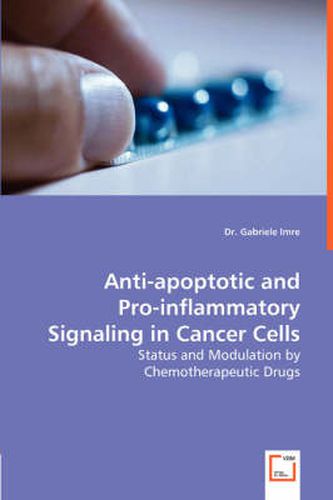Readings Newsletter
Become a Readings Member to make your shopping experience even easier.
Sign in or sign up for free!
You’re not far away from qualifying for FREE standard shipping within Australia
You’ve qualified for FREE standard shipping within Australia
The cart is loading…






This title is printed to order. This book may have been self-published. If so, we cannot guarantee the quality of the content. In the main most books will have gone through the editing process however some may not. We therefore suggest that you be aware of this before ordering this book. If in doubt check either the author or publisher’s details as we are unable to accept any returns unless they are faulty. Please contact us if you have any questions.
The transcription factor nuclear factor kappa-B (NFkB) plays a pivotal role in the immune response but is also involved in cancer development and progression. In unstimulated cells NFkB is kept inactive in the cytoplasm by inhibitor of NFkB (IkB) proteins. Dysregulation of the pathway or activation of NFkB by chemo-therapeutic agents may lead to cancer progression or drug resistance. The NFkB activation status was investigated in human lung cancer, pancreatic cancer, and hematopoietic cancer cell lines. Additionally, the potential of cytotoxic drugs in activating the NFkB signaling pathway was analyzed. Furthermore, the influence of histone deacetylase inhibitors (HDIs) on the NFkB pathway in human non-small cell lung cancer (NSCLC) cell lines was investigated. Incubation of NSCLC cells with HDIs reduced the responsiveness of NFkB to tumor necrosis factor-alpha (TNF-a). It was shown that this reduction was due to drastic downregulation of TNF-receptor 1 by HDIs. This effect of HDIs could also be shown for other tumor entities and normal cell lines. This book is of particular interest for students, scientists, and professionals working on NFkB and/or HDIs.
$9.00 standard shipping within Australia
FREE standard shipping within Australia for orders over $100.00
Express & International shipping calculated at checkout
This title is printed to order. This book may have been self-published. If so, we cannot guarantee the quality of the content. In the main most books will have gone through the editing process however some may not. We therefore suggest that you be aware of this before ordering this book. If in doubt check either the author or publisher’s details as we are unable to accept any returns unless they are faulty. Please contact us if you have any questions.
The transcription factor nuclear factor kappa-B (NFkB) plays a pivotal role in the immune response but is also involved in cancer development and progression. In unstimulated cells NFkB is kept inactive in the cytoplasm by inhibitor of NFkB (IkB) proteins. Dysregulation of the pathway or activation of NFkB by chemo-therapeutic agents may lead to cancer progression or drug resistance. The NFkB activation status was investigated in human lung cancer, pancreatic cancer, and hematopoietic cancer cell lines. Additionally, the potential of cytotoxic drugs in activating the NFkB signaling pathway was analyzed. Furthermore, the influence of histone deacetylase inhibitors (HDIs) on the NFkB pathway in human non-small cell lung cancer (NSCLC) cell lines was investigated. Incubation of NSCLC cells with HDIs reduced the responsiveness of NFkB to tumor necrosis factor-alpha (TNF-a). It was shown that this reduction was due to drastic downregulation of TNF-receptor 1 by HDIs. This effect of HDIs could also be shown for other tumor entities and normal cell lines. This book is of particular interest for students, scientists, and professionals working on NFkB and/or HDIs.